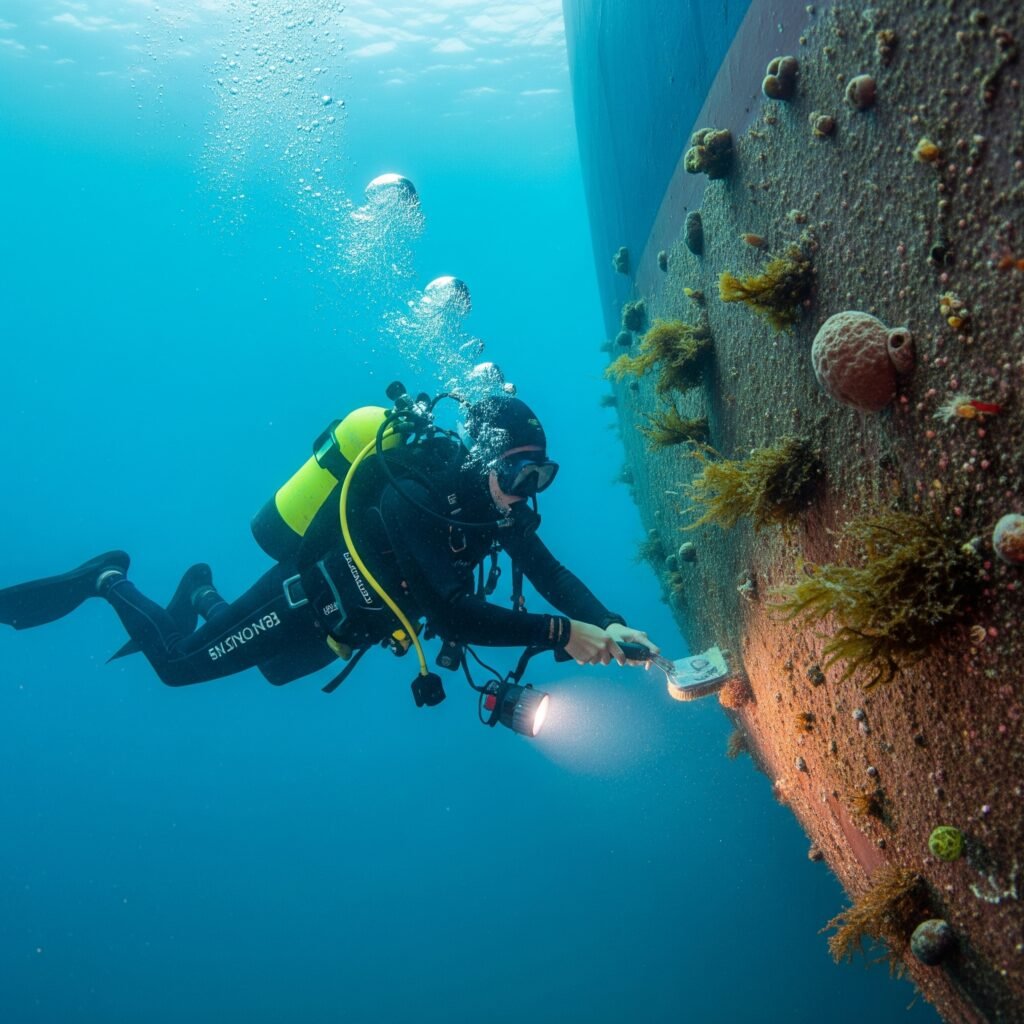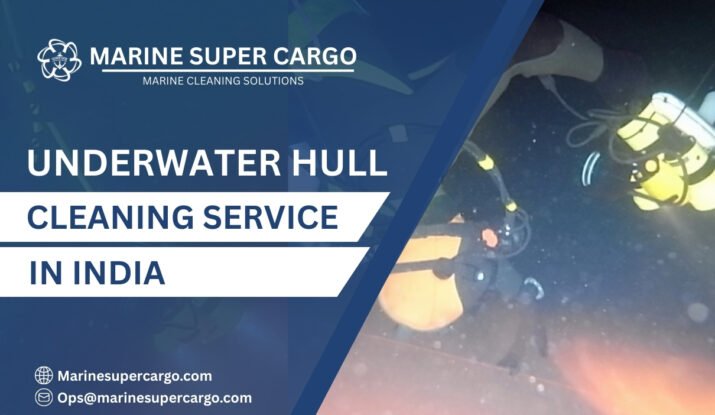Underwater ship hull cleaning in India involves removing marine growth from the submerged parts of a vessel’s hull without the need for dry-docking. This essential practice helps maintain optimal ship performance, reduce fuel consumption, and extend vessel lifespan.
With India’s maritime sector growing rapidly—driven by government initiatives from the Ministry of Ports, Shipping, and Waterways—the demand for professional hull cleaning is on the rise. India’s strategic location and busy ports make efficient, eco-friendly hull cleaning vital for supporting sustainable shipping and enhancing the nation’s maritime competitiveness.
What is Underwater Ship Hull Cleaning in India?
Underwater inspections refer to removing marine growth and fouling organisms like algae and barnacles from a ship’s hull while it remains underwater. This method differs from traditional, which requires dry-docking ships, which is time-consuming and costly.
In India, underwater hull maintenance is performed by trained divers or robotic systems using advanced technology, making the process faster and safer. The availability of such services at key ports is vital for supporting India’s growing commercial fleet. By utilizing efficient underwater inspection methods, Indian ports ensure minimal downtime and optimal vessel performance.

Why Hull Maintenance Matters for Ships
Hull fouling caused by marine organisms can dramatically affect a ship’s speed and fuel efficiency. The roughness created by algae, barnacles, and other growth increases drag, causing ships to burn more fuel to maintain speed.
Regular underwater ship hull cleaning in India helps prevent:
- Increased drag from biofouling
- Excess fuel consumption by as much as 30%
- Accelerated hull corrosion and damage
For Indian shipping companies, investing in routine underwater ship hull cleaning in India is essential to avoid costly repairs and excessive fuel costs. This maintenance step directly impacts the profitability and sustainability of operations in India’s maritime industry.
The Link Between Underwater Ship Hull Cleaning in India and Fuel Efficiency
Fuel efficiency gains are one of the most important benefits of underwater ship hull cleaning in India. Scientific research confirms that clean hulls reduce friction between the vessel and water, improving hydrodynamics and lowering fuel usage.
Indian operators who perform regular underwater ship hull cleaning report fuel savings of 10-15%. For the Indian maritime industry, these savings translate into millions of rupees in reduced fuel costs annually and contribute to lower carbon emissions—supporting national environmental commitments.
The Growing Demand for Underwater Ship Hull Cleaning in India
India’s position as a major maritime hub, with increasing cargo and commercial shipping traffic, has accelerated the need for professional underwater ship hull cleaning services.
Ports like Mumbai, Chennai, Kochi, and Visakhapatnam are witnessing a surge in demand for specialized underwater ship hull cleaning companies.
As the Indiana maritime industry expands, regular maintenance ensures vessels stay efficient, meet regulatory standards, and reduce operational costs.
Environmental Benefits of Regular Underwater Ship Hull Cleaning in India
Besides economic benefits has significant environmental advantages:
- It prevents the spread of invasive marine species through biofouling.
- It lowers fuel consumption, reducing greenhouse gas emissions.
- It aligns with India’s commitment to sustainable maritime practices.
Indian ports and shipping companies increasingly recognize underwater ship hull cleaning as a key part of environmental stewardship within the maritime sector.
India’s maritime industry aligns with global standards set by the International Maritime Organization (IMO), ensuring safer and cleaner shipping.
Challenges and Solutions in the Indian Context
Challenges facing India include:
- Seasonal weather disruptions, particularly during monsoons.
- Limited availability of advanced cleaning equipment in some ports.
- A shortage of skilled divers trained specifically for underwater ship hull cleaning.
- Complex regulatory requirements govern underwater maintenance.
However, solutions are emerging. Indian companies are investing in automated robotic cleaning technology and specialized diver training programs. Government support and maritime regulations are encouraging wider adoption of professional underwater ship hull cleaning services across Indian ports.

Case Studies / Success Stories
Many Indian shipping companies have realized the benefits of regular underwater ship hull cleaning:
- A Mumbai-based cargo company saved 12% in fuel costs after instituting quarterly underwater ship hull cleaning.
- Chennai port operators are reducing cleaning and boosting fuel efficiency.
- Coastal tanker operators in Kerala extended the lifespan of their vessels and reduced hull corrosion thanks to consistent schedules.
These examples showcase the critical role of enhancing operational efficiency in the Indian maritime industry.
Conclusion
Underwater ship hull cleaning in India is indispensable for improving ship performance, enhancing fuel efficiency, and supporting environmental goals in India’s maritime sector. As the Indian maritime industry grows, regular and professional maintenance will become a standard practice to ensure ships remain competitive and sustainable.
Maritime stakeholders in India must prioritize reducing operational costs, comply with regulations, and contribute to cleaner marine ecosystems. Advancements in technology and increasing industry awareness are set to play a pivotal role in India’s maritime future.
FAQ:
1. How often should a ship’s hull be cleaned underwater?
The frequency depends on factors like the ship’s operating region, water conditions, and type of marine growth. Typically recommended every 3 to 6 months to maintain optimal performance and prevent excessive fouling.
2. What is underwater ship hull cleaning, and why is it important?
The process of removing marine growth, such as algae, barnacles, and other fouling organisms, from the submerged part of a ship’s hull without dry-docking. It is important because it improves ship speed, reduces fuel consumption, and prevents corrosion and damage to the hull.
3. What technologies are used for underwater ship hull cleaning in India?
India uses a range of technologies, including high-pressure water jets, mechanical brushes, and robotic cleaning systems. Professional divers and remotely operated vehicles (ROVs) are also commonly employed for efficient and safe cleaning.
4. How does underwater ship hull cleaning in India affect fuel consumption?
Cleaning the hull reduces drag caused by marine growth, which allows ships to move more smoothly through water. This results in lower fuel consumption, sometimes saving up to 15% or more, translating to significant cost savings for shipping companies.
5. Are underwater Ship hull cleaning services safe for the environment?
Yes, when performed using approved methods and equipment, underwater ship hull cleaning minimizes environmental impact. It helps prevent the spread of invasive species and reduces harmful emissions by improving fuel efficiency. Compliance with international standards like those from IMO is essential.


